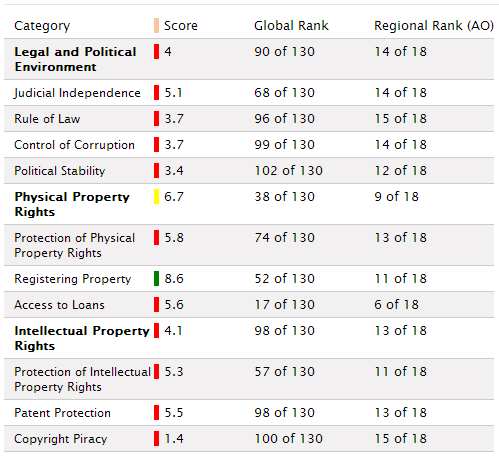Table of contents
The overwhelming majority of Indonesians know little to nothing about respecting intellectual property rights or IPRs, and act accordingly. Indeed, it is a huge problem here. The first National Intellectual Property Day was recently held to promote public awareness. But how bad is it?
The 2013 Property Rights Index which ranks 130 countries in three core categories; legal and political environment, physical property rights, and IPR ranks Indonesia 98 out of 130 countries in the IPR category. That’s about the 25th percentile globally; tied with the likes of Cameroon and Nicaragua, Nigeria and Haiti. So yes, it’s bad.

Indonesia Country Profile from the 2013 International Property Rights Index
Most companies don’t need a report to convince them that their IP is in danger. For a majority of foreign companies operating in Indonesia, IPR protection is high on the agenda.
From high technology to pharmaceuticals and from piracy and counterfeiting to inadequate judicial and prosecutorial systems, Indonesia’s IP infringement spans the gamut of industries and types of violations. The question on most foreign executives’ minds in Indonesia is not ‘is my company’s IP being violated’ but ‘what can we do to protect our IP in Indonesia’? And this is exactly the right question to ask.
Here is an effective strategy to deal with Intellectual Property violations in Indonesia:
1# Translate your problem into a government problem.
The Government of Indonesia is just as self-interested as your company. If you want the government’s help (and trust me you do) your job is to help them see what’s in it for them. Whatever type of IP you have, the fact that it is compromised presumably means, in the context of Indonesia, that it is being perpetrated by an illegal operation who is not paying taxes, may be negatively impacting related businesses and probably does not have international-level safety and quality standards. There may be other effects depending on your industry. While the government probably does not care a lot about your specific business it will care more about erosion of tax revenue, constraints to legitimate businesses and public safety risks.
HINT- There is a very good chance you will face vested interests, reticence, will be asked for a bribe, will be given the run around or number of other situations. Have canned answers ready for the first three scenarios and have a sense of humor about the rest.
2# Assess the net impact of the violations.
You want to ultimately cast light on these infractions to a point that they cannot be ignored by the government. Doing so requires answers to questions like:
How much money are you losing as a result of these violations? How much money is your industry losing? How many jobs does that account for? What does that translate into unpaid taxes? How does this compare to other ASEAN countries? What is the impact on the local industry? Are there impacts to related industries? What are the main points of leakage? What fix are you proposing and what impact do you expect the government to see? Can you site successful instances of implementation elsewhere? What specific resources can your company commit to the proposed fix?
HINT- Be as accurate as possible and be prepared to explain all of your assumptions. Falling into the temptation of exaggerating your estimates will only cause distrust and questions to your motives and legitimacy. In the end, if you fudge on the numbers you will have made your job much harder, perhaps impossible.
3# Identify and groom a champion
Responding to cases of IP violations in Indonesia are largely an exercise in government relations. That process becomes infinitely easier when you have a person in a position of influence that is willing to champion your cause.
Often times insight can be just as good as influence as it provides you with critical information into what’s happening behind the scenes, what’s the status, who needs to be further convinced, etc.
HINT- Provide your champion with the tools he needs to fully represent your position. This may include a position paper, key talking points and regular status briefs.
4# Assemble and mobilize a coalition
There are many reasons why you should consider rallying a coalition of like-minded organizations on this issue. Here are two.
First, there is strength and less risk in numbers. The more voices you have in your camp the louder the issue becomes, the more the government needs to pay attention, the more it needs to respond.
Second, unless others are crying foul , it can easily be perceived as either not being true or not that big of a deal. Chances are you are not the only one facing IP violations in your industry. Your coalition may include local industry associations, local and foreign chambers of commerce, other companies or other interested parties.
HINT- You must be in the driver seat and be willing to do much of the leg work on this issue because no one else feels the same sense of urgency.
5# Amplify your voice
You generally want to make sure the government hears your messages from more channels than just your direct engagement with them. Utilizing the media can expand your level of exposure and enhance your credibility. You cannot totally control or shape what comes out on in the media on your issue but you can assert your position and clearly state your perspective. As long as you are doing that you are moving the needle in your favor.
HINT- Your target audience is your pre-identified government stakeholders not necessarily the public.
Using this strategy and following these points is a proven way to bring the problem to the attention of those who make and enforce policies. Make them feel a sense of urgency.
Brian Sheley is the Managing Director of Cascade Asia Advisors, a boutique research and strategic advisory firm focused on Southeast Asia. He can be contacted at [email protected]







